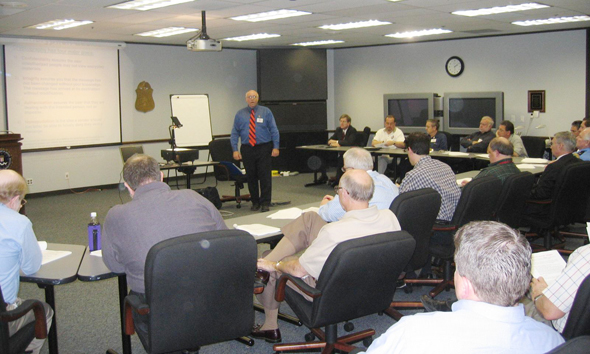Digital Forensics is Hot New Field
 |
| David Burris speaks to an FBI gathering
on digital forensics, a new SHSU program that begins this
fall. |
Sam Houston State University's new Center of Excellence in
Digital Forensics, which will train students and law enforcement
personnel in the latest technology for preventing cyber crime,
will be ready this fall.
Combined with new degrees being offered in forensics, the
facility will provide real-life training for working with
"cell phones, disks, and hard drives," said David
Burris, a professor of computer science.
Burris, has close ties to InfraGard, a program created by
the FBI to link together businesses, schools, and law enforcement
agencies to prevent criminal acts against the U.S. He recently
gave a presentation to FBI officials, who need help from higher
education.
"Right now, the shortage is so great, they don't know
how to cope," said Burris. "That's why the FBI formed
InfraGard, to encourage agencies to train people."
Burris said the average company was broken into three times
last year. With the break-ins typically costing $45 million
and the average electronic theft bringing in $20 million,
companies are willing to pay good salaries to prevent the
crimes. In this field, people just starting out can earn around
$50-60,000 a year, Burris said, with increases to about $150,000
in just three or four years.
Burris mentioned some recent criminal cases involving digital
forensics.
U.S. House of Representatives' and Senators' banking account
information was hacked, an AOL employee sold account information,
and some commercial flight reservations in major airline carriers'
computers were interfered with.
Burris pointed out that terrorists could even meddle with
air traffic control. Cnet.com, among other sites, theorized
that medical prescriptions and gas lines could be potential
targets.
In educating students about digital forensics, there are several
subjects that will be included in SHSU's new program: prevention,
capture, and prosecution. Each technician will need to know
how to get evidence, preserve it, and use it in court.
"This goes way beyond the stuff you see on CSI,"
said Burris.
He would like to see students interested in forensics also
take classes in chemistry, biology, geology, geography, even
entymology, and law, because in forensics, it is all related.
Computer crime is so new and growing so quickly, law enforcement
can't keep up with the new technology. Burris said more than
100 new viruses are written every day. Even home computers
are attacked repeatedly each day. It can take months for companies
or individuals to realize an attack has occurred, and once
people are aware, it takes even longer for virus updates to
be posted online.
Once an attack is detected, even the legal system is outmoded
in its ability to deal with the offenders. The new hacker
is not the stereotypical "genius teenager," but
a professional defrauder or even terrorist.
Because the demand is so great, "it's a tremendous job
market," said Burris. The undergraduate degree in digital
forensics will be available for the upcoming fall semester,
with a graduate degree available in spring 2006.
- END -
SHSU Media Contact: Kelly Jakubowski
March 9, 2005
Please send comments, corrections, news tips to Today@Sam.edu
|


